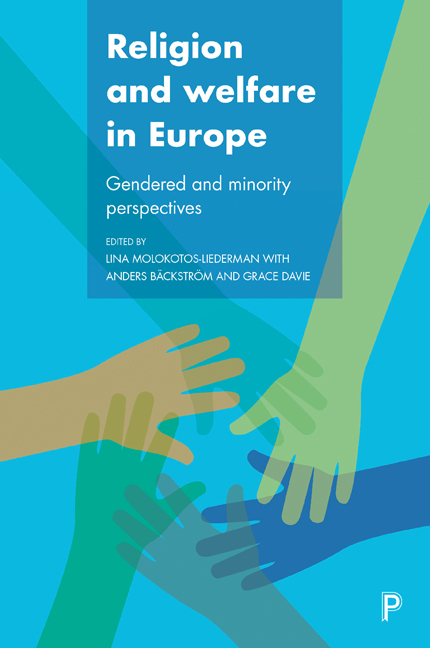Book contents
- Frontmatter
- Contents
- List of tables, figures and maps
- Acknowledgements
- Notes on contributors
- one Introduction
- Part One Thinking methodologically: approaches to research and practice
- Part Two Thinking regionally: key case studies in welfare and religion in Europe
- Part Three Gendered and minority perspectives
- Part Four Drawing the threads together
- Appendix: the WaVE team
- Index
one - Introduction
Published online by Cambridge University Press: 05 April 2022
- Frontmatter
- Contents
- List of tables, figures and maps
- Acknowledgements
- Notes on contributors
- one Introduction
- Part One Thinking methodologically: approaches to research and practice
- Part Two Thinking regionally: key case studies in welfare and religion in Europe
- Part Three Gendered and minority perspectives
- Part Four Drawing the threads together
- Appendix: the WaVE team
- Index
Summary
The question of how welfare is to be organised, and how large groups of migrants are to be integrated into the receiving countries, are major challenges for contemporary European societies. Equally important is the trust of citizens in the state's ability to address these issues. Such questions have two clear connections to religion: the ways in which the welfare state coexists with varying religious traditions, and the fact that growing religious pluralism has made religion increasingly visible as a legal, social and political force. How is social cohesion to be understood in a Europe that is being pulled apart, economically, socially and religiously?
The relationship between welfare and religion, as it developed during the 20th century, was shaped during the formative ‘golden years’ following 1945. Welfare became part of a modernity in which the relationship between religion and societal institutions, such as school, health and social care, was weakening rapidly or in some cases had ceased to exist. Studies of different welfare regimes have revealed, however, that their roots lie in contrasting political, social and religious circumstances. These circumstances function as a historically based ‘glue’ that helps to explain the subtle values that connect religion and welfare within these different systems – a point developed further in Chapter Five. As David Martin (2010) notes, the continuous relationship between religion and politics has resulted in different pathways to modernity and it is the character of this interaction that is important in European societies. This forms the basis for different types of trust in the individual and the state, both of which are necessary for the cohesion of society. Danièle Hervieu-Léger (2015) calls this trust or understanding a ‘grammar of collective memory’, based on values that are connected to deep cultural mentalities, which are slow to change.
Religion itself has different meanings. It can be both ‘hot’ or strong (manifested through strong family ties, or strong religious affiliations), but also ‘cool’ or broad (based on citizenship, human rights and the rule of law); it also unfolds in diverse ways and in different contexts. At one and the same time, moreover, religion is diminishing as a result of secularisation, evolving into something more spiritual, and reasserting itself through migration and growing diversity (Furseth, 2015).
- Type
- Chapter
- Information
- Religion and Welfare in EuropeGendered and Minority Perspectives, pp. 1 - 22Publisher: Bristol University PressPrint publication year: 2017



